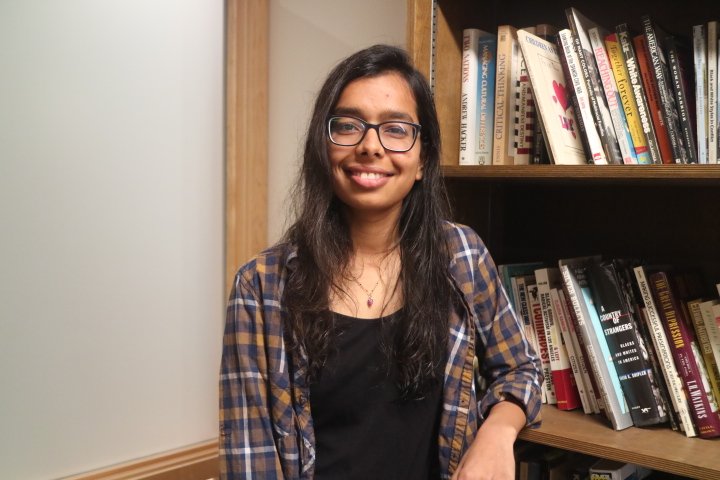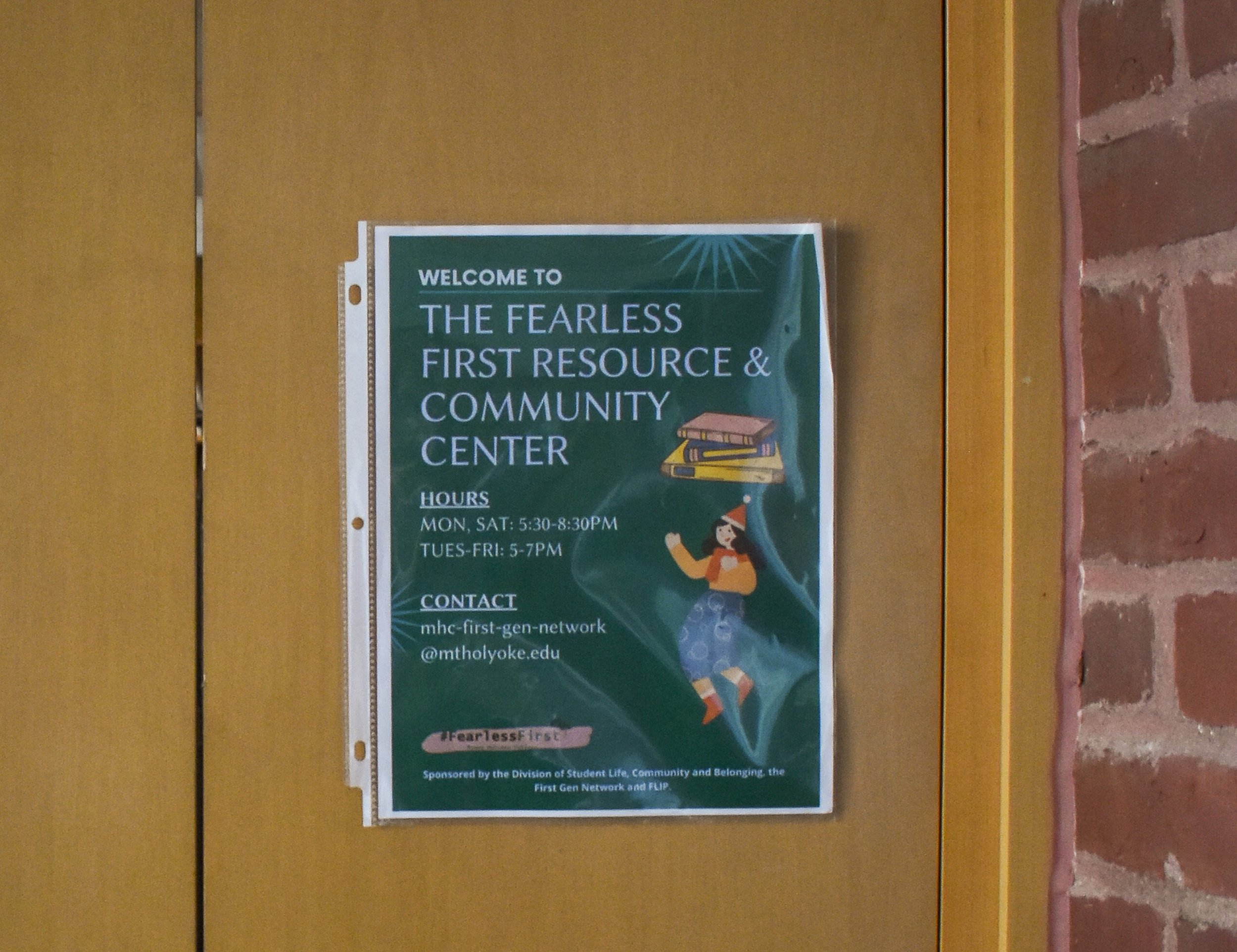Photos by Norah Tafuri ’25 (left) and Tzav Harrel ’24 (right).
Left: Deepika Kumawat ’24 is the president of the First Generation Low-Income Partnership, which provides resources and advice for FGLI students. Right: The Fearless First Resource and Community Center provides support and care for FGLI students.
By Norah Tafuri ’25
Staff Writer
A common denominator for many first generation and low income students is resilience — the resilience to transcend the bonds of circumstance and fearlessly and fiercely advocate for their community. Mount Holyoke College strives to make the campus welcoming, but as many FGLI students can attest, there will always be work to be done.
Mount Holyoke College defines a first-generation student as any student who is “the first to attend a four-year university and attain a college degree, did or do not have parents, guardians or family systems to assist them in navigating the college process [or] have current parents or family systems who did not attend a traditional four-year institution and attain a college degree.”
Additionally, the College identifies low-income students by the measure of their household’s annual income, which is “low relative to other households of the same size in their area/region. In the United States, a household is commonly classified as low-income and may be eligible for certain types of government assistance, including Federal Pell Grant, if its income is less than two times the poverty threshold, as determined by the U.S. Department of Health and Human Services. In 2021, a family of four living in the 48 contiguous states or Washington, D.C. would be considered low income if their household income was less than $53,000.”
According to the American Sociological Association, because of the absence of support in meeting students’ basic needs, “including food and housing insecurity, transportation, technology, family care and health care … colleges and universities have not been able to reach equity in [FGLI] persistence and graduation rates compared to their higher income peers, especially those whose parents attended college.” In the challenging effort to sustain themselves, FGLI students may struggle to participate actively and successfully as a student.
Professor of Psychology and Education Becky Wai-Ling Packard is one of many FGLI faculty at the College, and she describes a similar experience observed in her personal life and her academic research. As stated on her Mount Holyoke profile page, “Packard’s research focuses on mentoring, with an emphasis on how individuals such as first-generation college students, women and persons of color construct mentoring networks as they navigate complex pathways toward higher education and work.” Packard said, “I am now in a position where I can guide college completion and transfer efforts on the regional and national level — [for example, for] people like my dad who earned 62 credits but no credential, and countless others who are trying to make a life for themselves, sometimes school gets pushed to the side in order to survive.” Admission is only one part of the process, and the social mobility to be gained through a degree becomes very challenging for students continuing to face personal and financial instability.
Reversing this fact is the core mission of the First-Generation and Low-Income Partnership, otherwise known as FLIP. Mount Holyoke recognizes that “Dreams are universal, but opportunities aren’t always” on their website. With FLIP’s programming and the guidance of first-gen faculty, Mount Holyoke administration assures that FGLI students will “find a strong network and support system as well as a vibrant community” to aid in these challenges.
FLIP is a student organization composed of FGLI individuals who recognize the needs of their community members from a position of personal experience. Its organizational operations are largely housed in the Unity Center, which is also home to the Mixed Identity Student Collective, Student Government Association Students of Color Committee, MoZone Peer Justice Educators and Cultural Center student employees.
FLIP President Deepika Kumawat ’24 relayed her experience in her first year at Mount Holyoke College. She described the time spent anxiously working through her first housing form. “I spent like three hours on it because I didn’t know I could just tap on things. I was … [reviewing] everything, making sure that it was accurate.” Kumawat elaborated on her strenuous communications with Residential Life, explaining that she had to ask a lot of questions such as, “‘What do you mean by this question? Can you rephrase it?’”
This sort of frustration is not an isolated phenomenon. The American Sociological Association also noted that, “First-generation students are left to puzzle through bureaucracies of advising, financial aid, career services, health care and more, without family guidance or intervention with the institution. The puzzlement can be amplified for first-generation students who are also low-income, as [FGLI] students face opaque processes such as financial aid verification.”
Kumawat is determined to assist her community members. “[FGLI students] don’t expect … to [buy] $100 books. … You need to be used to staying away from your family and [build] … a community here.” Kumawat said “What else? Genuinely knowing how college works [is difficult], because our parents don’t know, [for example,] how many credits we have to take.” With FGLI students lacking familiarity with the college system and stable financial resources, every expense and decision is made alone.
Kumawat is motivated by the joy of FGLI students and is prepared to undergo enormous strain in order to ensure their security. Passionately, Kumawat proclaimed, “What do you want? Let me know. … 10 o’clock, I’ll be there for you.” Feeling similar to Kumawat, previous community members stepped forward as leaders to meet each other’s needs and recognize the intersecting concerns of first-generation and low-income students to form FLIP.
With great effort, FLIP has established a variety of programs, including the Safety Net Fund, which is open until April 27, intended to “support first-generation and/or low-income students who may have a difficult time accessing living necessities, technology, laundry … seasonal clothing and other needs to support academic learning in a remote environment, [such as] food, books and academic supplies [and] internet access.”
The First-Gen and Low-Income Faculty & Staff Directory, available on the FLIP website, helps facilitate mentorship between students and faculty and bridge the resource gap that many first-generation students may have. Packard is listed in the directory, and noted, “When I was growing up I struggled with the complexity of my life — at times, it felt unfair that I had to work so many hours and figure things out without an extensive family network to help me. Yet at the same time, I was so fortunate to have a mentor who helped change my life trajectory at a critical point in my life. When I became a professor at Mount Holyoke College, I was only 25 years old. Throughout my adult life, I have become really proud of my first-gen identity — and my multiracial identity — and what I have been able to do to support students’ in their pathways.” Reaffirming the system of support, faculty members hope to help students who might have been in a similar position to themselves.
“When I was growing up I struggled with the complexity of my life — at times, it felt unfair that I had to work so many hours and figure things out without an extensive family network to help me. ”
Additionally, when any student finds themselves unable to afford essential supplies ranging from textbooks, to mini fridges and winter gear, the Fearless First Resource Center can help ensure that the FGLI College community is as well-equipped and as comfortable as possible on campus. Finally, these FLIP resources are coupled with a variety of events held throughout the year such as mixers, panels with former alumni and cap decorating events for seniors. FLIP also has routine open hours at the Unity Center for members to discuss the organization alongside its leadership.
An anonymous FGLI student criticized the College administration, stating that these gatherings and the FLIP network are insufficient in empowering students in this community. They believe that the College administration’s gestures are not lessening the weight of the burdens FGLI students are forced to carry, but that more material support would. “What’s gonna fix [the College’s insufficiency] is material support that actually elevates and brings me up from [my] circumstances and makes me feel at home here and better able to … show up in the classroom,” the anonymous student said. “I can’t do that when I’m worried about work study or taking on loans.”
The effects of class are not only bound to the physical and financial resources, but manifest in every aspect of student life. “Being first-gen/low income, woman of color, child of immigrants … was a very different upbringing [from] a lot of the people here who grew up upper-middle class, white, [with] their parents … college educated. A lot of them [went to] very nice schools. And it’s a very different experience because … I’m just astounded by … how much I [feel] like, ‘Wow. I went through a lot of shit,’” the anonymous student stated. “I am … working through [this] almost every single day, but that’s also made me more … resilient because I’ve had to do a lot to be here and so I think I’m more able to be an advocate.”
Assuming the role of an advocate for first-generation and low-income communities, the anonymous student made it clear that while the social events and traditions make FGLI students known to one another, a deeper forum is required to make them seen by MHC administration.
“It seems like there’s a very strong disconnect in the culture of administration and the students,” the anonymous student said. They later elaborated on the significance of “[being] able to organize yourselves and talk to each other about issues that are important regarding first-gen, low-income, [and] class backgrounds at Mount Holyoke — because if no one speaks up and talks about their experiences, it’s not going to be solved ever.”
Thus, the anonymous FGLI student proclaimed the necessity of two spaces — one in which students can speak together, and another where students can speak directly to the College’s administration to voice their concerns. In the absence of a distinct forum to amplify the community’s voices, the sincere and continuous obstacles for FGLI students persist, and FLIP leadership is faced with a constant struggle to meet the basic needs of their community members.
Kumawat agrees that clearer communication between FGLI students is needed. “Sometimes you’re like, ‘Oh, it’s only me going to the bat, and then you see two other people, and now you want to fight for things, right?” Kumawat said. “You just need people with similar backgrounds to talk about it and then you decide what you want to do … like a dialogue space, which would be wonderful.”
Both students agreed that FLIP will change to continue to represent the needs of FGLI students. The next step in enabling a greater sense of interconnectivity among FGLI students would be creating a Living Learning Community. Kumawat explained, “FLIP could also be such a great LLC. … I feel like there’s so much community and bonding happening, and if you have a floor dedicated to everyone who was a little confused … we can solve it together.” Kumawat believes that, while the changes will help many students, there needs to be more expansive, recorded support from the FGLI community.
The anonymous FGLI student continued, “I don’t need a fucking journal. … I don’t need those mixers. … It needs to be followed up with the proper support.” For this student, lest Mount Holyoke boast about the grand achievements of FGLI students while letting them exist in alienation, the administration needs to do better. Be it establishing an LLC, or solidifying representation of FGLI in administrative decision making, everyone on campus must actively and loudly participate in the process of FLIP’s expansion and Mount Holyoke’s continual progress to ensure that the needs of FGLI students are met in full.


